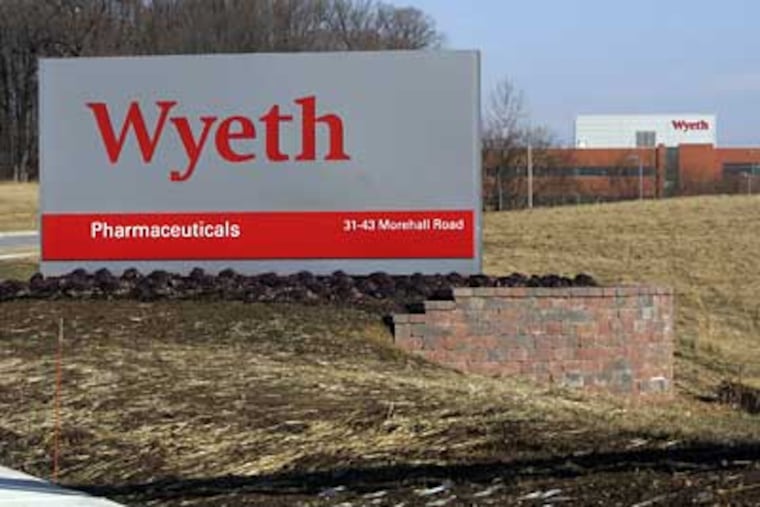Mixed response to Pfizer's buying Wyeth
The proposed $68 billion acquisition of Wyeth by Pfizer Inc. announced yesterday was the largest the pharmaceutical industry has seen in five years, but it inspired little enthusiasm among investors, who pushed the stock prices of both companies down.

The proposed $68 billion acquisition of Wyeth by Pfizer Inc. announced yesterday was the largest the pharmaceutical industry has seen in five years, but it inspired little enthusiasm among investors, who pushed the stock prices of both companies down.
The sweeping merger, which would create a company with 130,000 employees and sales of $70 billion, in the short-term helps Pfizer replace about $13 billion in revenue it will lose when the patent on its blockbuster cholesterol drug, Lipitor, expires in 2011.
But several analysts say the long-term benefits of the deal are far more murky. And the success of the combination will depend on big job cuts at both Pfizer and Wyeth. Pfizer is based in New York and employs about 82,000. Wyeth is based in Madison, N.J., and employs 47,000, about 5,000 of them in Collegeville and Malvern.
The companies said no decisions had been made yet on which facilities would be closed or reduced in size.
"While a Wyeth acquisition would help sooth the painful period that lay ahead of Pfizer," said Tim Anderson, an analyst with research firm Sanford Bernstein, "it will only be a partial salve." His models show revenue at the merged companies shrinking from $73 billion in 2010, to $62 billion in 2015.
Even so, executives at both companies said the deal would create an unstoppable force - selling everything from Robitussin to the best-selling childhood vaccine Prevnar.
"In one single transaction, the combination with Wyeth advances every single one of [our] strategies," Pfizer chief executive Jeff Kindler said in a news conference.
The acquisition gives Pfizer a strong foothold in biologics, drugs made from living organisms rather than from chemicals. Wyeth has experienced success in biologics, most notably with Enbrel, its rheumatoid arthritis drug. Wyeth also has potentially promising Alzheimer's drugs, a big market that so far has yielded little fruitful medicine.
But even if the combined company, which will be called Pfizer, hits a home run with a new drug, the success of the deal depends on budget cuts. The two companies estimated they would cut $4 billion in the three years after merging, but Anderson and others said the figure could be as much as $6 billion.
Pfizer and Wyeth have not put a number on total job cuts, but yesterday, Pfizer said it would eliminate 8,000 jobs before the merger. Pfizer also cut its dividend in half to save $1 billion per quarter in advance of the acquisition. It also reported a 90 percent drop in fourth-quarter income, due to a $2.3 billion charge to settle U.S. investigations into improper marketing of its pain-reliever Bextra and other drugs.
"They're both probably making the best of a sub-optimal situation," said Les Funtleyder, an analyst with Miller Tabak and author of the book Health-Care Investing: Profiting from the New World of Pharma, Biotech, and Health-Care Services. "Nobody has a great pipeline of new products in the pharmaceutical industry."
Daniel Hoffman, who runs a pharmaceutical research firm in Glenmoore, Chester County, said the proposed acquisition symbolizes the paltry number of new drugs reaching the market.
"This acquisition is not being done to acquire a portfolio of innovative compounds," Hoffman said. "Essentially, they're buying cash flow."
The deal will boost the value of executives' stock options.
Equilar Inc., an information-services firm specializing in executive compensation, estimated that the merger, at a closing price of $50.19 per share, increases the amount of Wyeth chief executive Bernard Poussot's exercisable stock options from about $163,000 to $1.7 million. If Poussot leaves the company after the merger, as he is expected to, he likely could exercise additional options worth $2.2 million, Equilar said.
Pfizer has said it would pay about $50.19 per share, $33 in cash plus 0.985 a share in its stock for each Wyeth share. But after the acquisition news yesterday, Pfizer's share price fell $1.80, or 10.3 percent, to $15.65 on the New York Stock Exchange. Wyeth shares also fell - 35 cents, or 0.80 percent, to $43.39 on the NYSE.
Poussot, in a call with investors, described the deal as "very attractive."
Deutsche Bank analyst Barbara Ryan was more positive than others. She said the deal should add 23 percent to earnings in 2012. Before the deal, she had expected Pfizer's yearly earnings per share to shrink 30 percent after the Lipitor patent expired. Now, she thinks that number will be only 10 percent.
Pfizer also would inherit Wyeth's legal problems. The company faces lawsuits by 10,000 women who claim its hormone-replacement drugs Prempro and Premarin cause breast cancer.
Wyeth also set aside $21 billion to resolve a decade of litigation over its fen-phen diet pill, pulled off the market in 1997.